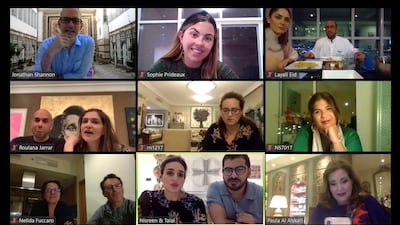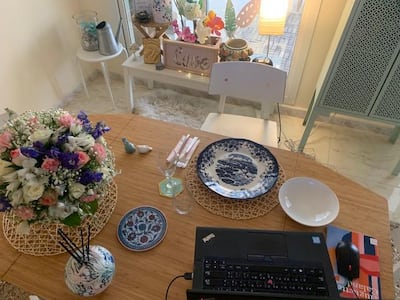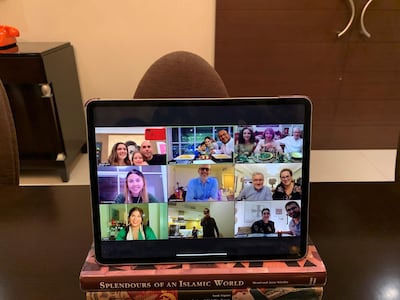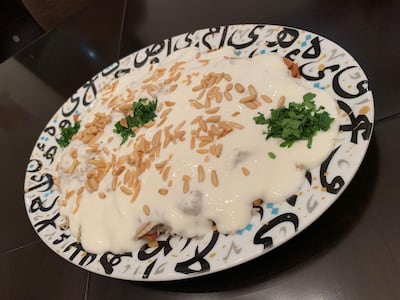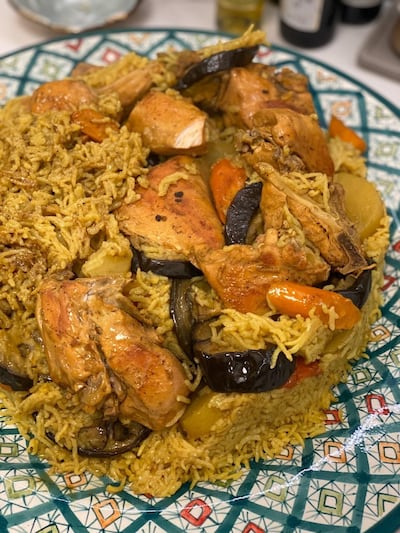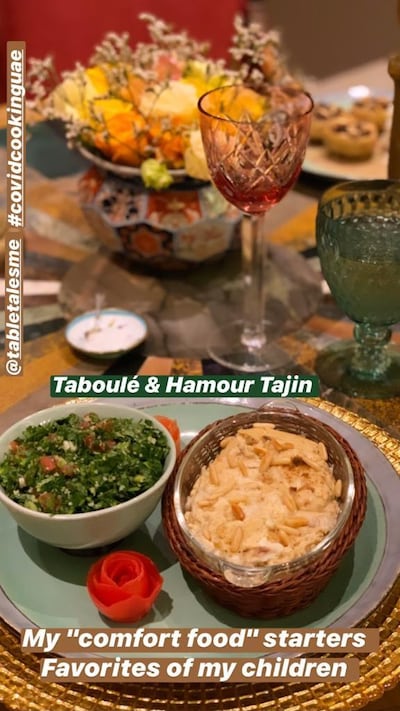There are so many things to think about when preparing for a dinner party: what you're going to make, how long everything takes to cook, how to set the table and, in the age of Covid-19, making sure you have a stable Wi-Fi connection.
Face-to-face dinner parties are off the table, at least for the time being. Instead, diners from all over the world are taking their meals online, virtually breaking bread with friends and family, as millions stay in their homes to help stem the spread of the coronavirus.
On Saturday night, I attended my first digital dinner party. I was one of 10 households from all corners of Abu Dhabi that Zoom-ed into this digital feast, organised by Hanan Sayed Worell, author of Table Tales: The Global Nomad Cuisine of Abu Dhabi. "We derive so much joy and pleasure form making and sharing food," she says, "I felt I had to do something as our social interactions gradually came to a halt."
"If cooking is a defining human activity, the act with which culture begins, and sharing food is what makes us civilised, how then do we adapt to the new situation presented by the Covid-19 pandemic?" the invite read. "While we are encouraged to practise social distancing in these difficult times, we also want to promote the conviviality of the dinner table as a source of nourishment for our spirits as well as our bodies in times of stress and uncertainty."
It was an intriguing offer, especially as, for me, it would mean eating dinner with nine relative strangers via my laptop’s webcam. The lure of human interaction and something to look at other than my Netflix home screen was enough to swing my vote. I was in.
Saturday’s ‘Distance Social Dinner Party’ was the first in a series from Table Tales. The plan is to host one a week, for however long this strange new reality goes on for. Each week, there will be a new host, the ‘King' or 'Queen’ of the party, and each of the attendees cooks their own three-course meal. Jonathan Shannon, a professor of anthropology at NYU, hosts the dinner I attend.
The idea behind the set-up for Table Tales, he explains, is modelled on Boccaccio's Decameron, which is about 10 people who escaped the bubonic plague by fleeing to the hills outside of Florence for 10 days. Each day, an individual tells their story.
“This was a beautiful work written in 1349, and I thought it would be really great for us to not escape to the hills, but to escape to our kitchens and dining rooms,” Shannon explains. “And instead of frolicking around in the hills of Tuscany, we could metaphorically do the same thing over meals, and each one of us will not only prepare a menu, but also tell a story related to that menu.”
There’s a theme, too, decided by the week’s host. Shannon chose comfort food, something that feels particularly apt, given the circumstances.
Now I am on the other side of having to prepare my own offering, I can admit I am not much of a chef. Or rather, I haven’t been, until the last couple of weeks. With a two-hour round-trip commute and one-hour gym class latched on to my usual working day, there’s not much time left for culinary prowess. Instead, I am all about feeding myself something quick, easy and nutritious. Most nights, it's grilled fish and vegetables.
But, since the coronavirus outbreak, I’ve found myself spending more and more time in the kitchen. For the first time in my life, I’ve wanted to bake cakes. I’ve experimented with ingredients, sought out new recipes, and felt pretty damn pleased with myself when sitting down to tuck in. It might be the boredom, but, I have a sneaking suspicion it’s more to do with the comfort food brings, something that, as this virtual dining experience reiterates, stems across all cultures.
As we eat, each diner takes it in turns to tell a story about their dish. They talk about how they’ve honed the recipe and why it brings them comfort. What we are lacking in sense of smell and taste, we gain in beautiful storytelling.
Around the virtual table, there are dishes from Palestine and Lebanon, Italy and France. I make a mushroom soup to start, sweet potato satay curry for my main course, all followed by a cinnamon apple crumble for dessert. Between us all, there are generations-old recipes, passed down from grandmothers and fathers, as well as new ones, picked up from travels and friends.
Having a 10-tile video call makes us all sit back and really listen to the stories being told.
As with any social situation right now, it’s hard to escape the topic of the coronavirus. It might be a virtual room, but the elephant is still there, creeping its way in to conversation, no matter how much we try and divert. But, we take the time to ask each other how they are feeling. It brings new meaning to the term "comfort food".
Two hours later, and I am still in the same chair at my dining room table with three empty bowls in front of me. It's been an evening of new faces, new recipes and new experiences. For something you can't actually do through a screen, it turns out the internet and cooking make a wonderful pairing. While we may not have fled to the hills, like those in Decameron, for two hours at least, we found our own modern-day escape.
